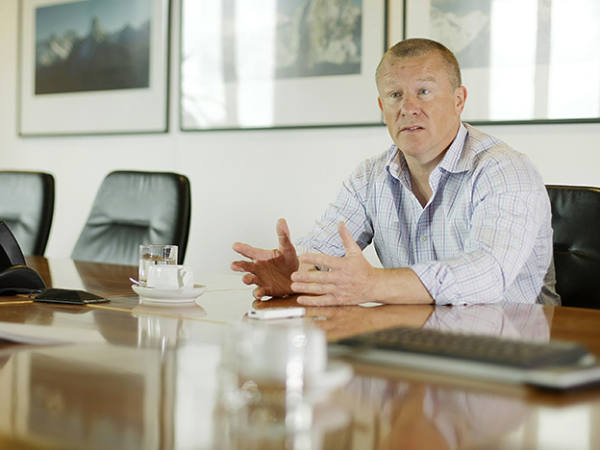Lowland Investment Company (LWI) paid out dividends worth 49p per share in its last financial year ended 30 September 2017, an increase of 8.9 per cent on the previous year. This was helped by its international exposure – 25 per cent of the trust's underlying earnings are paid in US dollars, which strengthened against sterling during that time.
And dividend growth has been strong for some time: for example, over the past five years the trust has grown its dividend at a compound rate of 10 per cent. This has also helped the trust build up a revenue reserve of nearly £13m, which means it has dividend cover of 0.94 years relative to what it paid out in its last financial year.
But the trust's current yield of around 3.5 per cent is slightly lower than its benchmark, the FTSE All-Share index's yield.
"Our focus is not on providing a high level of yield, but on companies that can genuinely grow their earnings and therefore grow their dividends over time," explains Laura Foll, co-manager of Lowland. "That's particularly important now, because what we're finding is that those companies that have a high level of absolute yield are often value traps that don't have much earnings growth. For example, Marks and Spencer (MKS), which has a headline yield of around 6 per cent, looks very attractive, but it hasn't grown its earnings in the past 10 years."
Seeking out value while avoiding pitfalls is something Ms Foll and co-manager James Henderson spend a lot of time thinking about. They describe their investment style as mildly 'contrarian' and often invest in companies facing difficult situations where they believe there is potential for a recovery.
"Selling [our approach] to people can be difficult because what you are saying is this company has a real problem and I'm wanting to buy it," says Mr Henderson. "But usually with companies things are never as good as you're told, and often they're also not as bad as you're told either."
A recent example is Scapa (SCPA), a global manufacturer of adhesive-based products, which was one of the top contributors to performance in the trust's last financial year. The trust's managers bought the company when it was mired in legal action with former employees who claimed that they had been exposed to asbestos. Scapa was also struggling with low margins on industrial tape for the automotive industry. But following a pivot towards the healthcare sector the company has staged a turnaround. The trust's managers originally bought it at 20p per share and sold the position out of Lowland at around £4 per share.
"It started off as a dull, problematic income stock which you didn't really want to admit to owning, but became one that growth investors are now buying," says Mr Henderson. "But when everyone says it's good, we have to leave the party and find the next load of problems, as the level of yield is now very low."
Their approach has paid off: the trust's net asset value (NAV) and share price both increased more than 16 per cent over 2017, ahead of its benchmark, the FTSE All-Share index's return of 13.1 per cent. And the trust has also outperformed over longer periods.
However, its managers do not always manage to avoid value traps and held services company Carillion (CLLN) when it went into liquidation in January. The position accounted for less than 1 per cent of Lowland's 120-stock portfolio, but exerted the biggest drag on performance in the trust's last financial year.
"The thing about contrarian buying is that you get it wrong sometimes," says Mr Henderson. "You've got to learn from your mistakes, but you mustn't generalise about a company that has specific problems, apply that to a whole sector and allow it to colour everything you do."
And they have recently bought into another support services company, Babcock (BAB), which has seen its share price slide following problems at Carillion and Capita (CPI).
"I think Babcock is somewhat unfairly lumped in with the likes of Capita and Mitie (MTO) because it is often the only contender for the contracts it is bidding for," explains Ms Foll. "With things like submarine decommissioning, Babcock is the only company capable of doing that in the UK so the margins it makes are more like 10 per cent, whereas the general contractors tend to aim for between 1 and 3 per cent."
Mr Henderson and Ms Foll take a multi-cap investment approach with Lowland, which typically has about a third of its assets in each of small, mid and large-cap companies. But at present they are finding more value in large-caps than in smaller companies, which had a strong run last year, so about 40 per cent of assets are now in large-caps. Examples of FTSE 100 companies they have added include Vodafone (VOD) and Land Securities (LAND). Financials are the trust's largest sector exposure, consisting mostly of insurance companies. Examples include Hiscox (HSX) and Prudential (PRU).
Royal Mail (RMG) is another recent buy, which they think is a market leader in the parcel business with good scope for margin improvements. The possibility that this company will be nationalised if the Labour Party wins power has sent its shares lower, appealing to their contrarian instincts.
But although they take a contrarian approach they are wary of domestic facing companies without defensive qualities. They are particularly cautious on the outlook for retailers and have sold out of furniture retailer DFS (DFS). They are putting an emphasis on finding companies with an excellent product or service, and good management, which can navigate what may be a more difficult economic environment.
They have also reduced gearing (debt) from around 15 per cent to 11 per cent in preparation for more difficult economic conditions.
Lowland Investment Company (LWI)
| PRICE | 1515p | GEARING | 11% |
| AIC SECTOR | UK Equity Income | NAV | 1,577.9p |
| FUND TYPE | Investment trust | DISCOUNT TO NAV | 4% |
| MARKET CAP | £409m | YIELD | 3.2% |
| No OF HOLDINGS | 121* | ONGOING CHARGE | 0.69%** |
| SET UP DATE | 05/04/1963 | MORE DETAILS | www.janushenderson.com |
| MANAGER START DATE | James Henderson: 01/01/1990; Laura Foll: 01/11/2016 |
Source: Winterflood Securities as at 08/02/18, *Janus Henderson as at 31/12/17, **The AIC
Performance
| Fund/benchmark | 1-year share price return (%) | 3-year cumulative share price return (%) | 5-year cumulative share price return (%) |
| Lowland | 8 | 30 | 58 |
| UK equity income trust average | 8 | 20 | 54 |
| FTSE All Share index | 6 | 21 | 46 |
Source: Winterflood Securities as at 08/02/18
Top 10 holdings as at 31/12/17 (%)
| Royal Dutch Shell | 6.6 |
| HSBC | 3.3 |
| Hiscox | 3.0 |
| Phoenix Group | 3.0 |
| Senior | 2.6 |
| Prudential | 2.5 |
| Irish Continental | 1.9 |
| Standard Chartered | 1.9 |
| Vodafone | 1.7 |
| GKN | 1.6 |
Sector breakdown as at 31/12/17 (%)
| Financials | 33.2 |
| Industrials | 27.8 |
| Consumer services | 10.2 |
| Oil & gas | 9.9 |
| Basic materials | 5.7 |
| Consumer goods | 5.1 |
| Health care | 4.2 |
| Telecommunications | 2.4 |
| Utilities | 1.3 |
| Technology | 0.3 |
Source: Janus Henderson











